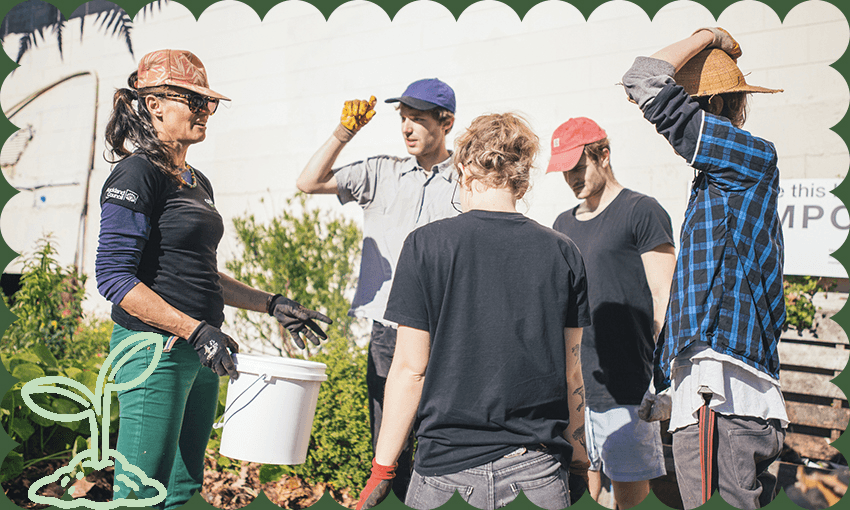At the Hobsonville Point Community Composting Hub, a web of Aucklanders, worms, microbes and kitchen scraps work in synergy to make compost. Charlotte Muru-Lanning discovers the scheme is not just good for the planet, but good for the community too.
Wedged between rows of mid-density urban housing and a swag of lush native ngahere in Auckland’s northwest sits the Hobsonville Point Community Composting Hub.
On Wednesday mornings it’s bustling with activity. Volunteers from near and far are potting seedlings from the nursery, weeding between the rows of rhubarb and herbs in the garden, sweeping the pathways and digging food scraps from the local community into their compost bins. Not only does this make smart use of waste, it keeps it out of the landfill.
As a country, we waste a bewildering amount of food. Aucklanders alone send about 100,000 tonnes of food waste to landfill each year. Although food waste naturally degrades much faster than other household waste, it still has a significant environmental impact – especially when it’s dumped into landfill. Food and organic waste accounts for around 9% of New Zealand’s biogenic methane emissions and 4% of our total greenhouse gas emissions.
“Food waste is a huge problem,” says Judith Rosamund who manages the hub. But she reckons those potato peels and eggshells offer up a big opportunity too: when processed correctly, they can be a treasure.
At the Hobsonville Point Composting Hub, this road to treasure starts off through the bokashi method of composting, which all their community compost contributors use. The network of composters is facilitated by The Compost Collective, a project to increase the number of Auckland households engaged in composting . The collective, which offers advice on getting started and runs regular free workshops, is a collaboration between Kaipātiki Project and EcoMatters Environment Trust, and is sponsored by Auckland Council.
Bokashi bins work like this: at home, you collect your food scraps in a bokashi bucket – which is basically a bucket with holes in the bottom inside another, slightly bigger bucket – with a clip-on lid. Every now and then you sprinkle a small amount of lactobacillus powder onto the layers of waste, which essentially pickles your scraps like a kind of kitchen-waste sauerkraut.
One of the composting team volunteers has brought his bucket into the Hobsonville hub today to add to the drop off bin. Donald lives in a townhouse and keeps his bucket in the garage, but says you could happily get away with keeping one on your porch or under the kitchen sink. Because of the collaborative way that the Community Composting Hubs operate, even if you don’t have a direct use for compost yourself, you can easily contribute your scraps instead of exiling them to landfill.
Today, Donald’s bucket is filled with three weeks’ worth of vegetable and fruit waste. Unlike regular compost bins which tend to start smelling pretty unpleasant within a few days, bokashi bins can go weeks without needing to be emptied. In fact when Donald lifts the lid on his, there’s just a faintly sour whiff, like yoghurt. As well as the plant matter, a liquid – known to adherents as bokashi “tea” – collects in the bottom bucket. This potent mix can, when watered down, be used as a fertiliser, as a weed killer, or to help clear the gunk out of drains.
Once dropped off at the hub, the fermented food scraps are added to a larger master bin where they go into large (aptly named) “composters”. The composters at the hub were funded in part by the Upper Harbour Local Board and Four Winds Foundation.
The composting process takes about three months as microbial action works to break down the organic matter into teenier and teenier pieces. This also causes the soon-to-be-compost pile to heat up naturally – the heap next to us is currently humming away at a toasty 65 degrees Celsius.
Unlike the compost you buy from garden centres and hardware stores, the end product is living – just teeming with worms and ready to be added to nourish the hub’s own kai patch or to be distributed among the community.
The very act of composting is an intervention that has the potential to change people’s habits and awareness for the better, Rosamund says. “Often, when people start doing this they begin to notice what they’re throwing out.”
Especially when you’re living in a city, it’s easy to become distanced from your impact on the environment. We leave our rubbish on the kerb and a stranger picks it up and takes it to an unknown location to be buried in landfill. Everything we flush or wash down the drain gets dealt with by someone else. Hardly any of us know what happens with the scraps we blitz into our waste disposal machine. It’s very much out of sight and out of mind.
In the first instance, Rosamund hopes that the physical presence of a bucket of scraps in the kitchen or the act of actively dropping off that bucket at the hub encourages people to waste less food in the first place.
But for the food that does end up being thrown away, Rosamund says “it’s not rubbish, it’s a resource”. Composting actually has the potential to rebuild our soil, which despite being a vital resource, is being destroyed at an alarming rate in Aotearoa. Urbanisation, infrastructure, industry, fertilisers and pesticides have stripped soil of its nutrients across the country. Composting offers a much needed replenishment. “Composting isn’t just about getting rid of waste, it’s actually about returning the nutrients and the carbon back to the soil so we can grow more food.” she says.
Reducing food waste helps lower our greenhouse gas emissions, including emissions in the food production process, as well as emissions from the decomposition of food waste in landfill.
Environmentalism can often feel overwhelming, and that in the grand scheme of things it’s difficult to make a meaningful difference as an individual. Using a community composting hub proves this assumption wrong. Compost your food scraps and you’re helping to keep waste out of landfill, ensuring that valuable nutrients aren’t lost forever and reducing the production of methane in landfills.
At the moment Hobsonville Point Community Composting Hub takes scraps from a network of 48 households, but Rosamund says they’re keen for more and have the capacity to service 120 homes at the moment. Aucklanders interested in becoming part of the composting network can take part in a free hour-long workshop by the Compost Collective sponsored by Auckland Council as part of the council’s commitment to achieving a zero waste city by 2040. And there are a growing number of composting hubs all around the city for other Aucklanders keen to get involved.
Not only is composting beneficial for the environment, as Donald says, it’s a way to connect to the world around you. “I’m retired,” he says, “so the companionship is very important mentally but also, it’s just great to see everything being broken down in the different stages.”
Being part of this process, a network of people, micro-organisms and household waste offers an expanded sense of community. “It’s sort of a bit of a connection in that you’re actually in a little way helping the Earth, and boy does it need help,” he says.
And while you’re saving the earth, it can be a lot of fun. “You just get such a kick out of worms having a party in your compost.”


